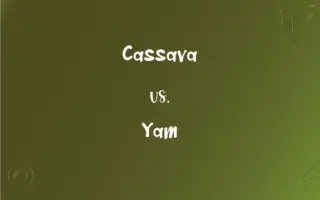Grass vs. Weed: What's the Difference?
Edited by Harlon Moss || By Janet White || Updated on September 29, 2023
Grass is a type of plant with thin, narrow leaves, while weed is any unwanted, typically invasive plant.

Key Differences
Grass is a familiar plant, recognized for its thin, narrow, green leaves, usually covering lawns and fields. It's a versatile and vital plant, serving as a primary food source for herbivorous animals, aiding in soil erosion control, and offering aesthetic value to landscapes. The term grass generally refers to plants belonging to the family Poaceae, which are characterized by a jointed stem, sheaths, and usually a fibrous root system. Grass is intentionally grown in many areas, such as gardens, parks, and sports fields, for its utility and beauty.
Weed, in contrast, refers to any plant growing where it is not wanted and, in many cases, to the detriment of the desired flora. Weeds can be invasive, propagating quickly and competing with cultivated plants for resources like nutrients, light, and water. The definition of weed is subjective, as one person's weed may be another person's cherished plant. They may include various plant types, not just grasses, that are deemed undesirable in a particular setting due to their invasive nature or other undesirable characteristics.
While grass is appreciated for its myriad of uses, including its role in the production of fodder, hay, and turf, and even its utility in ornamental landscaping, weeds are typically scorned for their disruptive presence. They often interfere with the growth and development of cultivated plants, leading to reduced yields and quality in agricultural settings. Grasses are usually uniform and are grown purposefully in gardens, lawns, and fields due to their ecological and aesthetic roles.
Weeds, however, are unpredictable and can emerge unexpectedly in gardens, lawns, and other cultivated areas. They are often resilient and can thrive in harsh conditions, making them difficult to control or eradicate. The struggle between maintaining the desired grass and controlling the unwanted weed is a constant battle for gardeners, landscapers, and farmers. Weeds can potentially harm the environment by outcompeting native flora, leading to a decrease in biodiversity and disrupting local ecosystems.
The distinguishing factor between grass and weed lies in the intent and desire of the grower or landowner. Grass is purposefully sown or maintained, valued for its specific characteristics and uses, whereas weed is the unwanted intruder, growing spontaneously and often met with annoyance and removal efforts. Understanding the dichotomy between grass and weed is crucial for effective gardening, agriculture, and land management.
ADVERTISEMENT
Comparison Chart
Definition
A type of plant with thin, narrow leaves.
Any unwanted, typically invasive plant.
Desirability
Typically desired and intentionally grown.
Generally undesired and grows spontaneously.
Types
Belongs to the family Poaceae.
Can include various plant types.
Impact on Environment
Prevents soil erosion, provides food.
Can be harmful by outcompeting native flora.
Control
Cultivated and managed.
Often needs to be controlled or eradicated.
ADVERTISEMENT
Grass and Weed Definitions
Grass
Green plant with jointed stems and long narrow leaves.
The grass is lush and green in the springtime.
Weed
A plant considered undesirable, unattractive, or troublesome.
The garden is overrun with weeds.
Grass
Ground cover plant used in lawns and fields.
They spent the day lounging on the grass.
Weed
A plant considered undesirable, unattractive, or troublesome, especially one that grows where it is not wanted and often grows or spreads fast or takes the place of desired plants.
Grass
Fodder for herbivorous animals.
The cows are grazing on the grass.
Weed
An aquatic plant or alga, especially seaweed.
Grass
A term for marijuana.
Some people use grass for recreational purposes.
Weed
Something considered useless, detrimental, or worthless.
Grass
A lawn or yard.
The kids are playing out on the grass.
Weed
Tobacco.
Grass
A member of the grass family.
Weed
A cigarette.
Grass
The members of the grass family considered as a group.
Weed
Marijuana.
Grass
Any of various plants having slender leaves similar to those of a grass.
Weed
A token of mourning, as a black band worn on a man's hat or sleeve.
Grass
Ground, as on a lawn, that is covered with grass or similar plants.
Weed
Weeds The black mourning clothes of a widow.
Grass
Grazing land; pasture.
Weed
Often weeds(Archaic) An article of clothing; a garment.
Grass
(Slang) Marijuana.
Weed
To clear of weeds
Weeded the flowerbeds.
Grass
(Electronics) Small variations in amplitude of an oscilloscope display caused by electrical noise.
Weed
To remove (weeds). Often used with out
Weed out dandelions.
Grass
Chiefly British Slang An informer.
Weed
To eliminate as unsuitable or unwanted. Often used with out
Weed out unqualified applicants.
Grass
To cover with grass.
Weed
To remove weeds.
Grass
To grow grass on.
Weed
(countable) Any plant unwanted at the place where and at the time when it is growing.
If it isn't in a straight line or marked with a label, it's a weed.
Grass
To feed (livestock) with grass.
Weed
Underbrush; low shrubs.
Grass
To become covered with grass.
Weed
A drug or the like made from the leaves of a plant.
Grass
To graze.
Weed
Cannabis.
Grass
Any plant of the family Poaceae, characterized by leaves that arise from nodes in the stem and leaf bases that wrap around the stem, especially those grown as ground cover rather than for grain.
Weed
Tobacco.
Grass
(countable) Various plants not in family Poaceae that resemble grasses.
Weed
A cigar.
Grass
(uncountable) A lawn.
Weed
(countable) A weak horse, which is therefore unfit to breed from.
Grass
Marijuana.
Weed
A puny person; one who has little physical strength.
Grass
An informer, police informer; one who betrays a group (of criminals, etc) to the authorities.
What just happened must remain secret. Don't be a grass.
Weed
Something unprofitable or troublesome; anything useless.
Grass
Sharp, closely spaced discontinuities in the trace of a cathode-ray tube, produced by random interference.
Weed
(archaic) A garment or piece of clothing.
Grass
Noise on an A-scope or similar type of radar display.
Weed
(archaic) Clothing collectively; clothes, dress.
Grass
The season of fresh grass; spring or summer.
Weed
(archaic) An article of dress worn in token of grief; a mourning garment or badge.
He wore a weed on his hat.
Grass
That which is transitory.
Weed
(archaic) Especially in the plural as widow's weeds: (female) mourning apparel.
Grass
Asparagus; "sparrowgrass".
Weed
(Scotland) A sudden illness or relapse, often attended with fever, which befalls those who are about to give birth, are giving birth, or have recently given birth or miscarried or aborted.
Grass
(mining) The surface of a mine.
Weed
(Scotland) Lymphangitis in a horse.
Grass
(transitive) To lay out on the grass; to knock down (an opponent etc.).
Weed
To remove unwanted vegetation from a cultivated area.
I weeded my flower bed.
Grass
To act as a grass or informer, to betray; to report on (criminals etc) to the authorities.
Thesaurus:rat out
Weed
(figurative) To pilfer the best items from a collection.
Grass
(transitive) To cover with grass or with turf.
Weed
(library science) To systematically remove materials from a library collection based on a set of criteria.
We usually weed romance novels that haven't circulated in over a year.
Grass
(transitive) To feed with grass.
Weed
Simple past tense and past participle of wee
Grass
(transitive) To expose, as flax, on the grass for bleaching, etc.
Weed
A garment; clothing; especially, an upper or outer garment.
He on his bed sat, the soft weeds he worePut off.
Grass
(transitive) To bring to the grass or ground; to land.
Weed
An article of dress worn in token of grief; a mourning garment or badge; as, he wore a weed on his hat; especially, in the plural, mourning garb, as of a woman; as, a widow's weeds.
In a mourning weed, with ashes upon her head, and tears abundantly flowing.
Grass
Popularly: Herbage; the plants which constitute the food of cattle and other beasts; pasture.
Weed
A sudden illness or relapse, often attended with fever, which attacks women in childbed.
Grass
An endogenous plant having simple leaves, a stem generally jointed and tubular, the husks or glumes in pairs, and the seed single.
Weed
Underbrush; low shrubs.
One rushing forth out of the thickest weed.
A wild and wanton pard . . . Crouched fawning in the weed.
Grass
The season of fresh grass; spring.
Two years old next grass.
Weed
Any plant growing in cultivated ground to the injury of the crop or desired vegetation, or to the disfigurement of the place; an unsightly, useless, or injurious plant.
Too much manuring filled that field with weeds.
Grass
Metaphorically used for what is transitory.
Surely the people is grass.
Weed
Fig.: Something unprofitable or troublesome; anything useless.
Grass
Marijuana.
Weed
An animal unfit to breed from.
Grass
To cover with grass or with turf.
Weed
Tobacco, or a cigar.
Grass
To expose, as flax, on the grass for bleaching, etc.
Weed
To free from noxious plants; to clear of weeds; as, to weed corn or onions; to weed a garden.
Grass
To bring to the grass or ground; to land; as, to grass a fish.
Weed
To take away, as noxious plants; to remove, as something hurtful; to extirpate; - commonly used with out; as, to weed out inefficiency from an enterprise.
Wise fathers . . . weeding from their children ill things.
Revenge is a kind of wild justice, which the more man's nature runs to, the more ought law to weed it out.
Grass
To produce grass.
Weed
To free from anything hurtful or offensive.
He weeded the kingdom of such as were devoted to Elaiana.
Grass
Narrow-leaved green herbage: grown as lawns; used as pasture for grazing animals; cut and dried as hay
Weed
To reject as unfit for breeding purposes.
Grass
German writer of novels and poetry and plays (born 1927)
Weed
Any plant that crowds out cultivated plants
Grass
Animal food for browsing or grazing
Weed
Street names for marijuana
Grass
Street names for marijuana
Weed
Clear of weeds;
Weed the garden
Grass
Shoot down, of birds
Weed
Unwanted plant growing wild, especially one that grows on cultivated ground.
We spent the afternoon pulling weeds from the garden.
Grass
Cover with grass;
The owners decided to grass their property
Weed
An inferior horse, esp. one worthless except for work.
He bought a weed at the market for a pittance.
Grass
Spread out clothes on the grass to let it dry and bleach
Grass
Cover with grass
Grass
Feed with grass
Grass
Give away information about somebody;
He told on his classmate who had cheated on the exam
FAQs
Is all grass considered a weed?
No, grass is not considered a weed when it is desired and intentionally grown.
Is grass only green?
While grass is typically green, it can also be brown when dormant or dead.
Can grass grow in the shade?
Some types of grass can grow in the shade, but most prefer sunlight.
Is dandelion a weed?
Dandelion is typically considered a weed, but it is also edible and medicinal.
Can weeds be beneficial?
Some weeds can be beneficial, providing food for pollinators and improving soil health.
Are weeds harmful to other plants?
Many weeds can be harmful as they compete with other plants for resources.
Is turf a type of grass?
Yes, turf is a surface layer of earth containing dense growth of grass.
Can a weed be a flowering plant?
Yes, many weeds produce flowers.
Is bamboo a type of grass?
Yes, bamboo is a member of the grass family Poaceae.
Do all grasses produce seeds?
Most grasses produce seeds, but some reproduce primarily through runners or rhizomes.
Are weeds always unwanted?
While typically unwanted in gardens and lawns, some weeds are valued for their uses and benefits.
Can weeds be used in herbal medicine?
Yes, many weeds have medicinal properties and are used in herbal remedies.
Can weeds be controlled naturally?
Yes, weeds can be controlled through manual removal, mulching, and other natural methods.
Do grasses have flowers?
Yes, grasses do produce flowers, but they are often small and inconspicuous.
Is ornamental grass different from lawn grass?
Yes, ornamental grasses are grown for their aesthetic value and can be different from typical lawn grasses.
About Author
Written by
Janet WhiteJanet White has been an esteemed writer and blogger for Difference Wiki. Holding a Master's degree in Science and Medical Journalism from the prestigious Boston University, she has consistently demonstrated her expertise and passion for her field. When she's not immersed in her work, Janet relishes her time exercising, delving into a good book, and cherishing moments with friends and family.
Edited by
Harlon MossHarlon is a seasoned quality moderator and accomplished content writer for Difference Wiki. An alumnus of the prestigious University of California, he earned his degree in Computer Science. Leveraging his academic background, Harlon brings a meticulous and informed perspective to his work, ensuring content accuracy and excellence.








































































